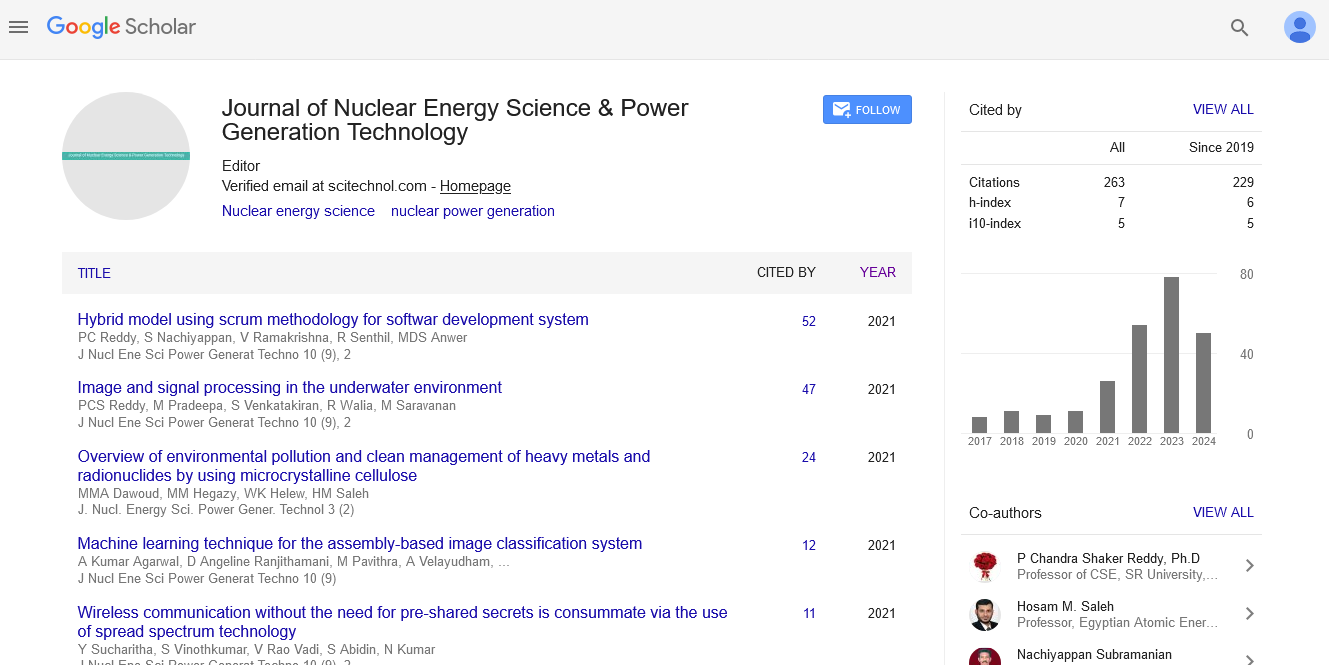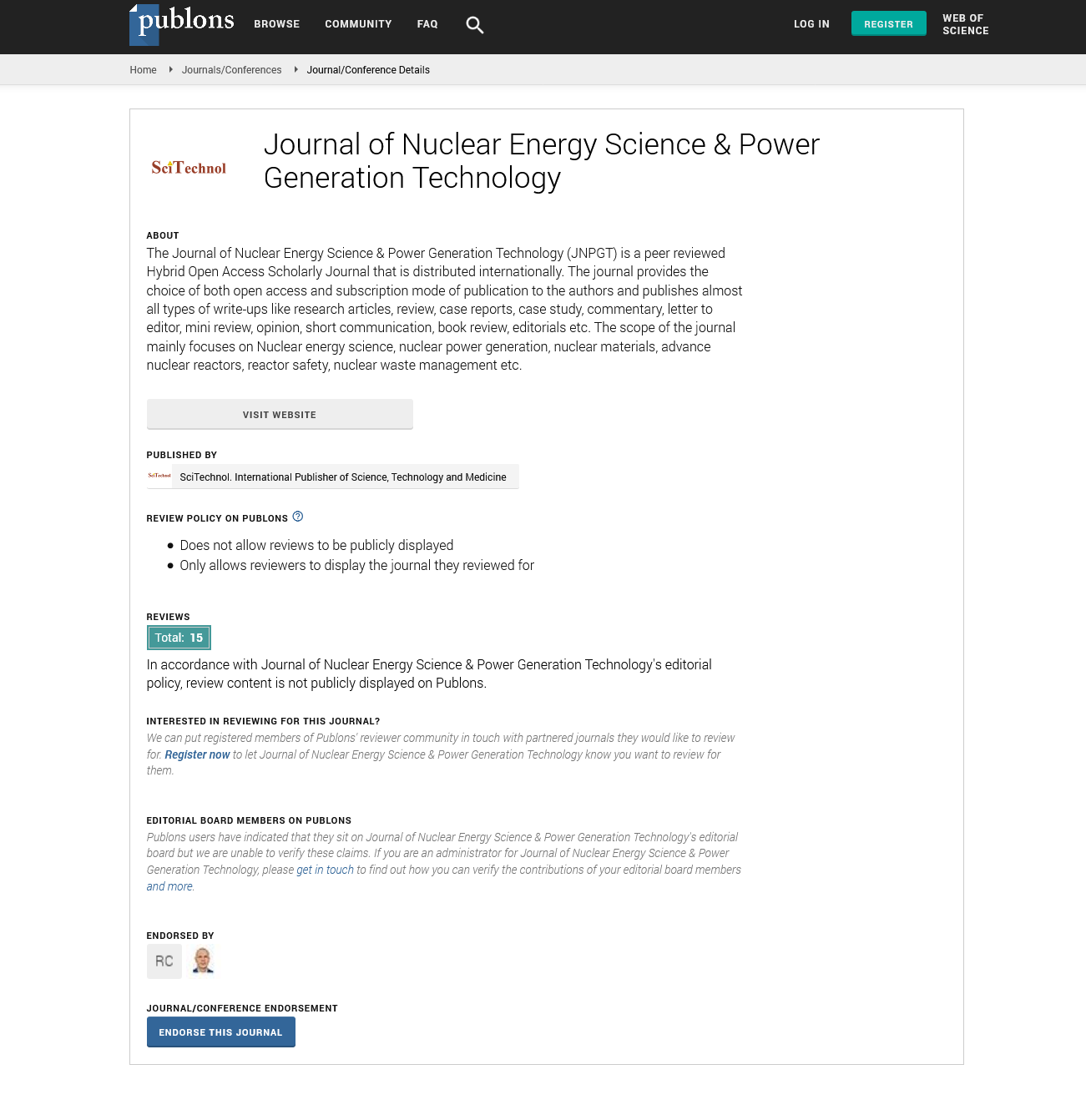Opinion Article, J Nucl Ene Sci Power Generat Technol Vol: 13 Issue: 6
Proliferation-Resistant Nuclear Technologies: Securing the Future of Clean Energy
Jonathan Keller*
1Department of Nuclear Engineering and Technology, University of Cape Town, Cape Town, South Africa
*Corresponding Author: Jonathan Keller,
Department of Nuclear Engineering and
Technology, University of Cape Town, Cape Town, South Africa
E-mail:jonathankeller38@
gmail.com
Received date: 21 October, 2024, Manuscript No. JNPGT-24-154875;
Editor assigned date: 23 October, 2024, PreQC No. JNPGT-24-154875 (PQ);
Reviewed date: 06 November, 2024, QC No. JNPGT-24-154875;
Revised date: 13 November, 2024, Manuscript No. JNPGT-24-154875 (R);
Published date: 21 November, 2024, DOI: 10.4172/2325-9809.1000429.
Citation: Keller J (2024) Proliferation-Resistant Nuclear Technologies Securing the Future of Clean Energy. J Nucl Ene Sci Power Generat Technol 13:6.
Description
The nuclear proliferation the waste of nuclear materials and technologies for weapons development position significant challenges to the global expansion of nuclear energy. Proliferation-resistant nuclear technologies aim to statement these concerns, enabling the safe and secure deployment of nuclear energy while reducing the risk of misuse. Nuclear production involves the spread of materials, technology or knowledge that can be used to develop nuclear weapons. Traditional nuclear fuel cycles, particularly those involving uranium enrichment and plutonium reprocessing, pose inherent risks due to their dual-use potential. Nations and organizations seeking to expand their nuclear capabilities for peaceful purposes could in theory, divert materials or technology to weaponization, threatening global security. To moderate these risks, the development and deployment of proliferation-resistant technologies have become a priority for policymakers, scientists and international organizations.
Proliferation-resistant technologies reduce or eliminate the production of weapons-grade materials during the nuclear fuel cycle. Advanced monitoring and verification technologies ensure that nuclear materials are used exclusively for peaceful purposes. Technological features that make diversion or misuse of materials difficult (e.g., low-enriched uranium fuels). Institutional measures, such as international inspections and agreements, that enforce nonproliferation norms. Thorium is a potential alternative to uranium for nuclear fuel. Thorium-based cycles produce less plutonium and can be designed to minimize the generation of weapons-usable isotopes. SMRs are designed with inherent safety features and reduced proliferation risks. Their smaller fuel inventories and sealed core designs make them less attractive targets for diversion. MSRs use liquid fuel, which allows for continuous removal of fission products and reduces the accumulation of weapons-usable materials. Proliferation-resistant technologies favor dry storage and direct disposal of spent nuclear fuel, avoiding reprocessing methods that could separate plutonium.
AI-powered surveillance systems, satellite imaging and blockchain based tracking of nuclear materials enhance the ability to detect and prevent diversion. Developing and deploying proliferation-resistant technologies require significant research, development and investment. Nations with established nuclear programs may be reluctant to adopt new technologies or protocols. The cost of implementing advanced technologies and safeguards may hinder adoption in developing nations. Proliferation-resistant technologies can expand access to nuclear energy without compromising security. Scaling up safe nuclear energy deployment supports the transition to a low-carbon energy future. Investments in these technologies initiative advancements in materials science, engineering and data analytics. Nuclear energy is a basis in the global effort to combat climate change and light the escalating energy demands of a growing population. Its ability to generate large-scale, low-carbon electricity positions it as an indispensable component of sustainable energy strategies. However, the expansion of nuclear power comes with challenges, particularly regarding proliferation risks the development and deployment of proliferation-resistant technologies have emerged as a important priority.
Conclusion
These technologies enable the safe and secure expansion of nuclear energy while minimizing the risks of nuclear weapons proliferation. Proliferation-resistant technologies are designed to ensure that nuclear materials and technologies are used exclusively for peaceful purposes. Advances in this field encompass innovative approaches to nuclear fuel cycles, reactor designs and real-time monitoring systems. For instance, closed fuel cycles that recycle spent nuclear fuel can reduce the accumulation of weapons-grade materials. Similarly, nextgeneration reactor designs incorporate features that make it more challenging to divert materials for non-peaceful uses. Monitoring and verification systems, powered by artificial intelligence and advanced sensors, are enhancing transparency and building trust among nations.
 Spanish
Spanish  Chinese
Chinese  Russian
Russian  German
German  French
French  Japanese
Japanese  Portuguese
Portuguese  Hindi
Hindi 

